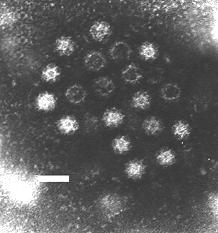
Calicivirus

The Caliciviridae are a family of viruses, members of Class IV of the Baltimore scheme. They are positive-sense, single-stranded RNA which is not segmented. Seven species are placed in this family, divided among five genera. Diseases associated with this family include feline calicivirus (respiratory disease), rabbit hemorrhagic disease virus (often-fatal hemorrhages), and Norwalk group of viruses (gastroenteritis). Caliciviruses naturally infect vertebrates, and have been found in a number of organisms such as humans, cattle, pigs, cats, chickens, reptiles, dolphins and amphibians. The caliciviruses have a simple construction and are not enveloped. The capsid appears hexagonal/spherical and has icosahedral symmetry (T=1 or T=3) with a diameter of 35–39 nm. Caliciviruses are not very well studied because until recently, they could not be grown in culture, and no suitable animal model has been found. However, the recent application of modern genomic technologies has led to an increased understanding of the virus family. A recent isolate from rhesus monkeys—Tulane virus—can be grown in culture, and this system promises to increase understanding of these viruses. The name calicivirus is derived from the Greek word calyx meaning cup or goblet, due to many strains having visible cup-shaped depressions. The Caliciviridae family includes these genera: Group: ssRNA(+) Two additional genera have been proposed: Recovirus for a novel calicivirus detected in stool specimens (Tulane virus) from rhesus monkeys and Valovirus for a novel group of swine caliciviruses known as the St-Valérien-like viruses. These genera have yet to be officially approved. A number of other caliciviruses remain unclassified, including the chicken calicivirus. All viruses in this family possess a nonsegmented, polyadenylated, positive-sense, single-strand RNA genome around 7.5–8.5 kilobases in length, enclosed in an icosahedral capsid of 27–40 nanometers in diameter.
